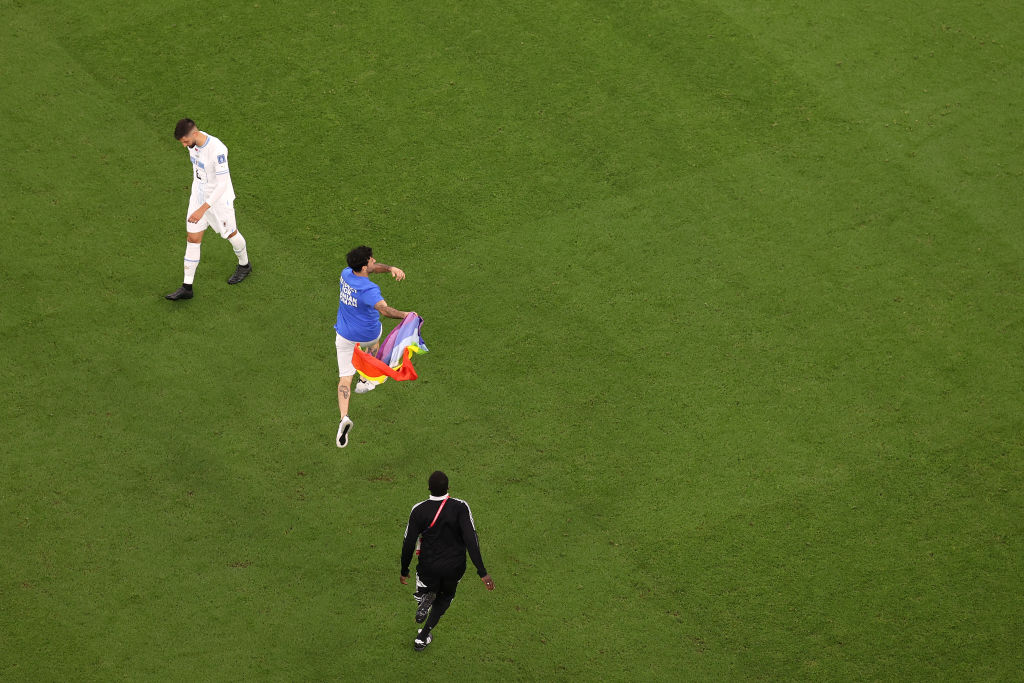A man invades the pitch wearing a T-shirt reading "I Respect Iranian Women" and holding a rainbow flag during the FIFA World Cup Qatar 2022 Group H match between Portugal and Uruguay at Lusail Stadium on August 28. November 2022 in the city of Lusail Qatar.
(Photo by Ryan Pierse/Getty Images)
(CNN Spanish) --
Criticism rains down on FIFA and the Qatari monarchy.
It's like a downpour of dirty water.
They accuse the monarchy of labor crimes and against human rights, as well as anti-feminist policies and against the LGTBQ community.
They blame FIFA for having organized the great world soccer festival in Doha, the futuristic capital of Qatar.
Criticism began timidly in 2010 when Qatar was chosen to host the 2022 World Cup. In these 12 years, the small great oil country has invested some US$ 220,000 million for its planetary debut.
Couldn't they have protested louder, and a little earlier?
Convince their democratic governments in time to avoid the mess in which the rich Arab country finds itself?
No. Because the desired publicity effect comes precisely when the crime is committed.
And what a crime, the biggest and that entertains millions.
It is estimated that some 5,000 million people will enjoy the magnificent game of the king of sports.
And expensive commercials from the developed world fill the screens as they air.
Top scorers, assists and recoveries of the Qatar 2022 World Cup: data and statistics
And everyone pays for publicity, publicity that Qatar thought would earn it profits and world prestige.
But it has not resulted in just that.
These are some of the controversies:
1- The process of choosing Qatar as the venue
The British newspaper Sunday Times assured that the Arab country paid more than US$ 5 million in bribes to ensure support for his candidacy.
Qatar totally denied the accusation.
2- The weather and the change of date
Qatar was a "high risk" venue, according to reports from FIFA itself, given the intense heat, with temperatures exceeding 50 degrees Celsius.
The situation resulted in the championship being moved to November, to an exceptional extent.
advertising
How many deaths did the construction of the stadiums for the World Cup in Qatar leave?
this is what we know
3 - The conditions of immigrant workers
The British newspaper The Guardian published that the figure could rise to 6,500 dead workers from 2010 until the completion of the works.
This figure has not been independently verified by CNN and the World Cup Organizing Committee in Qatar told CNN that only 3 work-related and 30 unrelated immigrants died in that period.
The Qatari government has denied the accusations and maintains that it has passed labor laws to protect workers.
4 - The suspension of Russia
The suspension of the Russian Federation, due to the war in Ukraine, an unusual extreme for FIFA, generated controversy: the organization did not suspend the United States after the invasion of Iraq in 2003, nor Saudi Arabia after the start of its military operations in Yemen, in 2015, to cite just two examples.
5 - The situation of the LGBTQ collective
Qatar is one of the 136 countries in the world where sexual relations between people of the same gender are criminalized, according to the Human Dignity Trust, an organization that defends LGBTI groups globally.
6 - Women's rights
Women in Qatar, as in countries where Islam is the official religion, —> DV: Can we do “as in countries where Islam has established the laws” or something similar?
they face numerous forms of discrimination based both in law and in practice, according to Amnesty International.
7 - The accusations against Qatar for supporting terrorism
In 2017, a group of Persian Gulf countries, led by Saudi Arabia, severed diplomatic relations with Qatar, which they accused of supporting terrorism.
The Qatari government said these theories were fictitious.
But in January 2021, Qatar and the Arab countries led by Saudi Arabia – the list is completed by Bahrain, the United Arab Emirates, Yemen and Egypt – agreed to restore diplomatic relations.
Personally, these latest accusations are the most confusing of all those leveled – especially from developed countries – against Qatar.
It is well known that the culture, traditions and customs that emanate from the teachings of Islam prevail throughout the Islamic world.
Not since yesterday, but for centuries.
And that means that, if those traditions are reprehensible in this case, the organization of a world event like the World Cup should never be allowed in a country whose beliefs are based on the Koran.
Nor in any of the 136 countries that criminalize same-sex relationships, as indicated by Human Dignity.
That of support for terrorism in Doha is also compromised, and without denying or confirming Qatar's participation in said support, it is surprising that the one who initially accused it of terrorism, Saudi Arabia, modified its verdict four years later and reestablished relations with Qatar: Saudi Arabia , the country of the Wahhabi faction, whose nationality was held by 15 of the 19 attackers of the criminal terrorist act of 9/11;
(although the responsibility of the Saudi State was never proven) whom Iran has accused of supporting ISIS in an attack on its territory in 2017 and in whose consulate in Istanbul Jamal Khashoggi, an opposition journalist, was dismembered.
Is there hypocrisy in Qatar 2022?, without a doubt, but not only in one part of the simple equation "good and bad", always tendentious and unreal.
Hypocrisy is the most blessed sin in politics, the most elegant dissimulation in the press, and the most used technique in commerce.
It exists in the countries of liberal democracy, which praise multiculturalism within their borders, but when there is something opposite in the culture, traditions or customs of other peoples, they fiercely attack it, based on moral superiority.
A moral superiority that - without taking human rights issues into account - seems to me obviously hypocritical.

